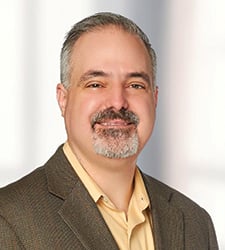 In each edition of Cycle Up, we sit down with one of the leading voices on the Meduit team. In this issue, we’re talking with Jason Petrasich, Sr. V.P. of AI for Meduit, to talk about AI and its power to solve revenue cycle challenges and accelerate cash.
In each edition of Cycle Up, we sit down with one of the leading voices on the Meduit team. In this issue, we’re talking with Jason Petrasich, Sr. V.P. of AI for Meduit, to talk about AI and its power to solve revenue cycle challenges and accelerate cash.
Since Jason likes building new things to make the revenue cycle better, it might not be a surprise that he likes to build things with Lego in his spare time.
“There’s something relaxing to me about the structure and logic of building a Lego set,” Jason says. “If you peek in my office in Charlotte, you’ll see a few Lego plants, a little Lego Grogu (baby Yoda) and a Lego treasure chest filled with candy!”
Q: What originally brought you to Meduit and what are you working on now?
A: Meduit approached me with the opportunity to create something that’s never been done before – the virtual employee. So, I jumped at the chance. I’ve always been driven to find process improvements and new technologies to make our industry more efficient, and this seemed a perfect fit. I’d also worked with Meduit’s CEO, Jeff Nieman, in previous organizations, so I was comfortable that Meduit would be a great environment to work in. And I was right—the company has provided everything I needed to make this a success, and we’re now working 150,000+ accounts every month with MeduitAI!
Q: Can providers benefit from revenue cycle AI strategies in today’s healthcare environment?
A: Absolutely. Wherever providers are struggling with the volume of work, AI automation can help relieve that. It doesn’t mean that jobs will go away, just that more work gets done, which helps providers financially. And the payers are rushing to use AI to deny or stall payment of claims. So, providers need to step up with automation to keep up with the increase in claim rejections. It may be a ‘battle of the bots,’ but providers need to use AI to stay competitive.
Q: Your team developed Meduit’s Supervised Autonomous Revenue Associate (SARA) a couple of years ago. She has continued to apply machine learning to achieve the milestone of doing the work of 150 FTEs and solving 2M+ tasks. Why has SARA been able to achieve this level of success, and why is this important for providers?
A: I think the main reason for this success is due to eliminating the need for the client’s IT to be involved, build interfaces and do testing. That takes a tremendous amount of time and resources. We can skip all that and just start working, similar to hiring a temp employee to do a job. If it’s something that can be done automatically, we can program her to perform that task.
Q: What do you see for SARA’s future? Will she continue to learn and grow at this pace?
A: Our clients are continuously challenging us to take on more tasks, and more complicated tasks. SARA is learning how to read emails from patients, identify what they are asking for and determine if it’s something that can be done automatically.
Q: Are there new tasks that SARA is accomplishing or will be able to complete soon that she is not now doing?
A: The next frontier for SARA is conversational AI. That involves being able to listen to a live patient call, understand the request or question and either respond with a solution or route it to the correct place for an agent. Meduit is currently building some initial pilots for this and should begin testing this spring. SARA conversational AI will support our clients and their patients with her 24/7/365 availability and more efficient service, which will improve patient satisfaction.